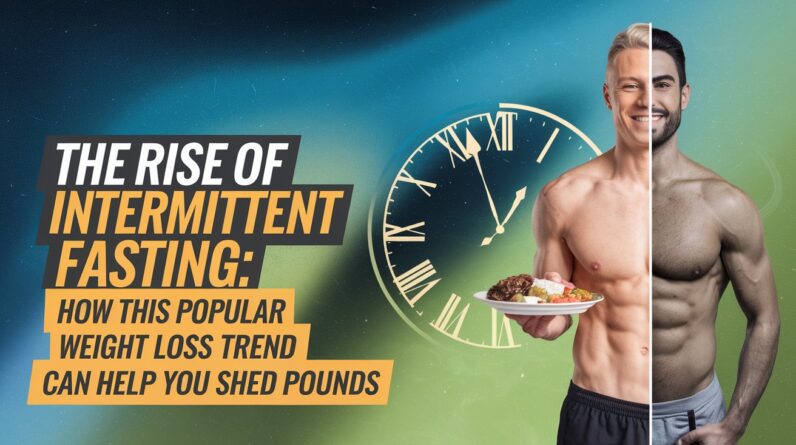
In recent years, intermittent fasting has skyrocketed in popularity as one of the most effective weight loss methods. Unlike traditional dieting, which focuses on what you eat, intermittent fasting centers around when you eat, making it a flexible and sustainable option for many. This article will dive deep into the science behind intermittent fasting, its benefits for weight loss, and how you can safely implement it to achieve your weight loss goals.
1. What Is Intermittent Fasting?
Intermittent fasting (IF) is a dietary approach that alternates between periods of eating and fasting. The most common methods include:
- 16:8 Method: Fasting for 16 hours and eating within an 8-hour window.
- 5:2 Method: Eating normally for five days a week and restricting calorie intake (around 500-600 calories) on the other two days.
- Alternate Day Fasting: Alternating between days of normal eating and fasting.
The goal of intermittent fasting isn’t necessarily to restrict what you eat but to give your body extended periods of fasting to tap into fat stores for energy, resulting in weight loss.
2. Why Is Intermittent Fasting So Popular for Weight Loss?
Intermittent fasting has gained traction for a variety of reasons:
- Flexible eating plan: Unlike strict diet plans that dictate exactly what you can and cannot eat, intermittent fasting allows you to fit it into your schedule.
- No calorie counting: For many, traditional calorie counting can be tedious and unsustainable. Intermittent fasting simplifies the process by focusing on meal timing instead of calorie restriction.
- Boosts metabolism and fat burning: Studies show that fasting for longer periods can increase metabolic rate and enhance fat burning. When fasting, your body depletes glycogen stores and turns to stored fat for energy.
- May reduce insulin resistance: One of the primary benefits of intermittent fasting is its ability to lower insulin levels, making it easier for your body to burn fat. High insulin levels are often linked to weight gain, so keeping them low through fasting may help with weight loss.
3. How Does Intermittent Fasting Work for Weight Loss?
When you fast, several things happen in your body that promote weight loss:
- Lower insulin levels: When you eat, insulin levels rise. High insulin prevents your body from burning fat. By fasting and reducing insulin levels, your body is more likely to use stored fat as energy.
- Increased norepinephrine: Fasting boosts norepinephrine, a hormone that helps break down fat cells and use them for energy.
- Enhanced fat burning: After several hours of fasting, your body shifts from burning glucose (sugar) for fuel to burning stored fat. This shift can lead to significant fat loss over time.
4. Tips for Starting Intermittent Fasting for Weight Loss
If you’re interested in trying intermittent fasting to lose weight, here are a few tips to get you started:
- Choose the right fasting method: The 16:8 method is one of the easiest ways to begin. Start with a 12-hour fasting window and gradually increase to 16 hours as your body adjusts.
- Stay hydrated: During fasting periods, drink plenty of water, herbal teas, or black coffee. Staying hydrated will help curb hunger and prevent dehydration.
- Avoid overeating: During your eating window, focus on balanced meals rich in lean protein, healthy fats, and whole grains. Avoid the temptation to binge eat or consume junk food.
- Listen to your body: If you feel excessively tired, dizzy, or weak, reconsider your fasting schedule. Intermittent fasting should be sustainable and not cause undue stress on your body.
5. Common Myths About Intermittent Fasting
Despite its popularity, there are a few myths surrounding intermittent fasting that need to be debunked:
- Myth 1: Fasting will slow down your metabolism. Research shows that short-term fasting (up to 48 hours) can actually boost your metabolism, not slow it down.
- Myth 2: Fasting leads to muscle loss. As long as you’re consuming adequate protein during your eating window, intermittent fasting shouldn’t cause muscle loss. In fact, many people combine fasting with strength training to maintain or even build muscle while losing fat.
- Myth 3: Fasting makes you overeat. While some worry that fasting could lead to overeating during eating periods, studies show that most people tend to naturally eat fewer calories overall while intermittent fasting.
6. Is Intermittent Fasting Safe for Everyone?
While intermittent fasting can be a safe and effective weight loss method for many people, it’s not suitable for everyone. Those who should avoid fasting include:
- Pregnant or breastfeeding women
- Individuals with a history of eating disorders
- People with certain medical conditions (e.g., diabetes) who need to eat regularly to manage blood sugar levels
Before starting any new dietary plan, it’s a good idea to consult with your healthcare provider to ensure it’s safe for your individual needs.
7. Conclusion: Why Intermittent Fasting Could Be Your Key to Weight Loss
Intermittent fasting has become a go-to strategy for weight loss, not only because it’s flexible and easy to follow, but also because it’s backed by science. By reducing insulin levels, boosting fat burning, and promoting a healthier metabolism, this method can be an effective tool for achieving your weight loss goals.
If you’re looking for a sustainable and scientifically proven way to shed pounds, intermittent fasting might just be the trend you need to try.






